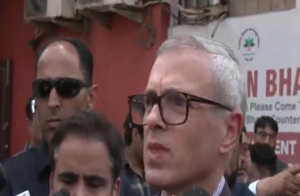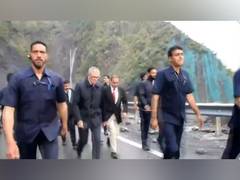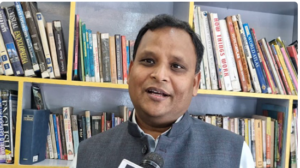Human trafficking a challenge, not limited to weaker sections of society: J&K LG
Srinagar, Apr 27 (PTI) Jammu and Kashmir Lieutenant Governor Manoj Sinha Thursday described human trafficking as a challenge, besides drug smuggling and illegal arms trade, saying though it is directly linked to social and economic development, it is not limited to weaker sections of society.
Speaking at an awareness programme on anti-human trafficking here, Sinha called upon the society to collectively fight the challenge.
https://www.upsc.gov.in/FR-CSM-22-engl-230523.pdf
“After drug smuggling and illegal arms trade, human trafficking is a challenge before us. I hope this seminar, along with creating awareness, will also create a roadmap which will help the law enforcement agencies in stopping it,” the LG said.
He said that in the present times, human trafficking was not a small challenge but “an extraordinary one”.
“National and international criminal networks have become a part of this crime. Thousands of innocents suffer because of this. Economically weaker sections of society, women, children, migrants, and the displaced especially are unsafe when it comes to human trafficking,” he added.
Sinha said the society as a whole has to fight together to end human trafficking.
“If the power of every section of society is put together, then this campaign (against human trafficking) will gain momentum. It is our collective responsibility,” he said, adding human trafficking is a huge blot on our society.
There is a need to centre an integrated approach of stakeholders, along with progressive law enforcement, against those forces whenever there is an apprehension that people could be trafficked. So, apart from rescue and rehabilitation, it is important to focus on its prevention, Sinha added.
The LG said while it is a reality that human trafficking is directly linked to social and economic development, it is not limited to weaker sections of society or the poor.
https://www.upsc.gov.in/FR-CSM-22-engl-230523.pdf
“So, the experts on human trafficking investigations and law enforcement officers impress that it is important to deliberate upon its origin, transit and destination so that the network is controlled,” he said.
He also said there is a need to review the approach if criminals take advantage of loopholes in the system.
He said anti-human trafficking cells were active in 11 districts of the Union territory, while in the rest nine, they will be set up very soon.
Rekha Sharma, chairperson, National Commission for Women (NCW), which organised the seminar, said human trafficking is a very serious crime “and these days, it doesn’t have boundaries whether it is Kashmir or Kanyakumari, this is prevalent everywhere”.
“Sometimes, even the victims do not know that they are victims of human trafficking, which is because of the lack of awareness. This is our first of its kind programme in J-K, where all the forces, NGOs, state commissions, everybody is together to talk about it, to make people, especially students, aware of the problem, that nobody is out of reach of this problem,” she told PTI.
Sharma said in the last few years, it has been seen that in Kashmir also, women are getting targeted and National Crime Records Bureau (NCRB) data shows that it has increased about 15.26 per cent in 2022.
“It is only the tip of the iceberg because the NCRB data doesn’t give the true picture. We must now work towards saving our daughters, saving our children. This is the main purpose of the NCW,” she said.
Asked when the women’s commission would be functional in Jammu and Kashmir, she said “the process is on”.
“Otherwise, when the state assembly, the government is there, then they nominate the state commission. But, they (the government) are thinking out of the box something, and I think the files are on the move,” she added.
https://www.upsc.gov.in/FR-CSM-22-engl-230523.pdf
To a question about unregistered domestic help agencies in J-K, she said that is also one way of trafficking.
“They make promises to women, get them here or anywhere else in India, saying that they will get paid well or get a job, but they do not get paid properly, and (they are) being misused.
“In Kashmir, trafficking through marriage has increased. Women are being brought from West Bengal on the promise of a job, but then forcefully married off to somebody,” she said.






